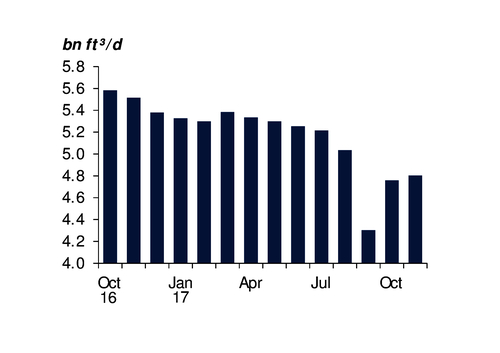News
05/02/26
Rotterdam biomarine 2025 sales fall as bio‑LNG surges
London, 5 February (Argus) — Marine biodiesel sales fell on the year in
Rotterdam in 2025, but bio-LNG and biomethanol made sharp gains while
conventional bunker fuels were roughly steady. Marine biodiesel blend sales fell
by 16pc to 629,700t in 2025 from 2024, according to data from the Port of
Rotterdam. Sales declined by 18pc in the fourth quarter from the third quarter.
Data from the Port of Singapore, on the other hand, showed strong growth in
blend sales, with marine biodiesel sales higher by 56pc year-on-year in 2025.
This was driven by higher uptake of B24, B30 and B100 used to meet FuelEU
Maritime requirements, which came into effect in 2025 and require ships coming
in, out of, and operating within EU waters to reduce emissions. Rotterdam sales
fell due to more competitive pricing east of Suez, pulling demand towards
Singapore. B24 Ucome dob Singapore prices averaged $685.71/t in 2025, compared
with $797.23/t for B30 Ucome dob ARA. Shipowners bunkering marine biodiesel in
Singapore for EU-bound voyages can use it for FuelEU Maritime compliance. Energy
used on voyages between EU and EEA ports and non-EU ports has a 50pc share of
regulatory coverage, and full coverage for voyages intra-EU. Compliance
generated from bunkering marine biodiesel in Singapore can then be used to
achieve compliance on vessels operating European routes, via the pooling
mechanism, in which obligated companies can combine their compliance balance
with other vessels. This has driven an emerging FuelEU compliance surplus
market, where participants can buy compliance via pooling to avoid physical
bunkering of alternative marine fuels. For use of bio-LNG, over-compliance has
sold at a significant premium to cost. As a result, bio-LNG bunker sales in
Rotterdam jumped by more than 500pc on the year to 17,650m³ in 2025 on strong
demand , and by 1,975pc on the year in the fourth quarter. Biomethanol sales
rose by 200pc on the year to 11,800t in 2025, also supported by FuelEU Maritime
and an increase in the number of methanol-capable vessels coming into operation
— 60 methanol-capable vessels were in operation or on order in 2025, according
to DNV data, compared with 17 in 2024. Sales of conventional bunker fuels in
Rotterdam in 2025 were largely stable, up by 1pc on the year to 8.73mn t. But
ultra-low sulphur fuel oil (ULSFO) sales rose by 16pc on the year, to the
highest since 2021, as demand rose to reflect stricter requirements after the
Mediterranean was designated an emissions control area (ECA) by the
International Maritime Organisation (IMO) in May. Vessels transiting the sea are
limited to emitting 0.1pc sulphur. The sulphur emission limits of the ECA in the
Mediterranean also contributed to firmer demand for marine gasoil (MGO) and
marine diesel oil (MDO). Sales of the products at Rotterdam were up 7pc on the
year while fourth quarter sales were unchanged on the year but up by 4pc on the
quarter. MGO-based marine biodiesel blends firmed to record highs of 93,200t in
2025, supported by the ECA expansion. But European decarbonisation and
regulations — such as EU ETS expansion, FuelEU Maritime, and RED III — made
very-low sulphur fuel oil (VLSFO) less attractive for shipowners that are
seeking ECA-compliant 0.1pc sulphur fuels such as ULSFO or marine gasoil. VLSFO
sales fell by 7pc on the year in 2025 while fourth quarter VLSFO sales were down
8pc on the year but up 17pc quarter on quarter. The increase in scrubber-fitted
vessels continued to support sales of high-sulphur fuel oil (HSFO) at Rotterdam,
which increased 3pc on the year. HSFO sales at the port in the fourth quarter
were up by 3pc on the year but down by 8pc on the quarter. By Hussein Al-Khalisy
and Siew Hua Seah. Rotterdam bunker sales t Fuel 2025 2024 y-o-y % 4Q 2025 3Q
2025 q-o-q % 4Q 2024 y-o-y % ULSFO 864,782 748,186 16% 219,039 232,720 -6%
193,567 13% VLSFO 2,850,083 3,076,817 -7% 745,786 635,638 17% 810,831 -8% HSFO
3,420,908 3,330,327 3% 804,962 872,077 -8% 780,437 3% MGO/MDO 1,590,902
1,483,332 7% 402,781 387,173 4% 395,903 2% Conventional total 8,726,675
8,638,662 1% 2,172,568 2,127,608 2% 2,180,738 -0% Biofuels blends 629,706
752,103 -16% 161,934 198,515 -18% 118,201 37% LNG (m³) 992,911 941,366 5%
192,433 331,620 -42% 263,068 -27% Bio-LNG (m³) 17,644 2,775 536% 11,932 960 92%
575 1975% Biomethanol 11,819 3,946 200% na na na 930 na Port of Rotterdam Send
comments and request more information at feedback@argusmedia.com Copyright ©
2026. Argus Media group . All rights reserved.



